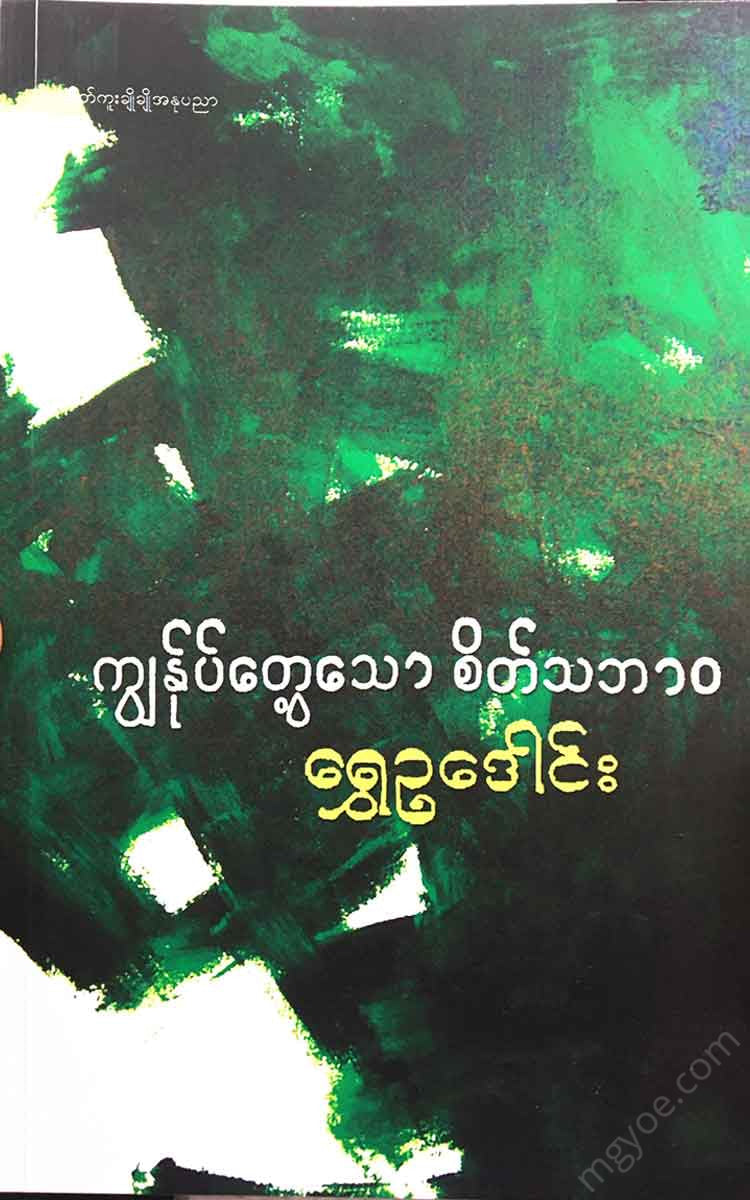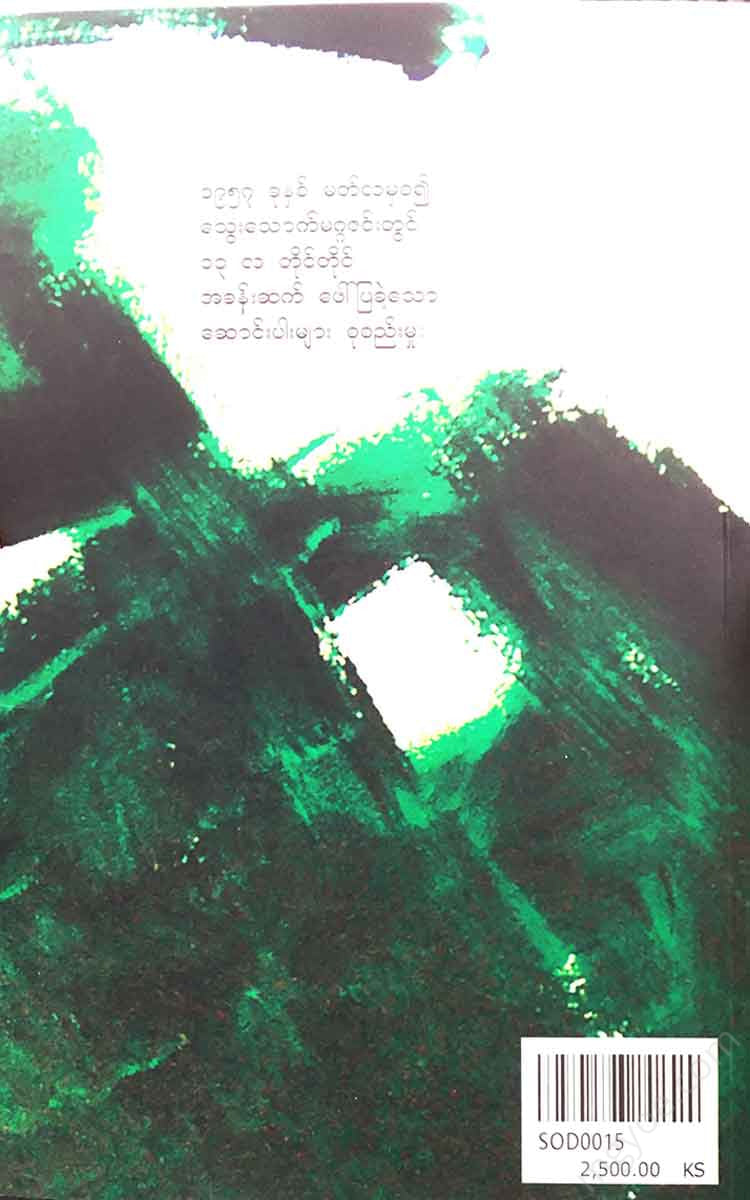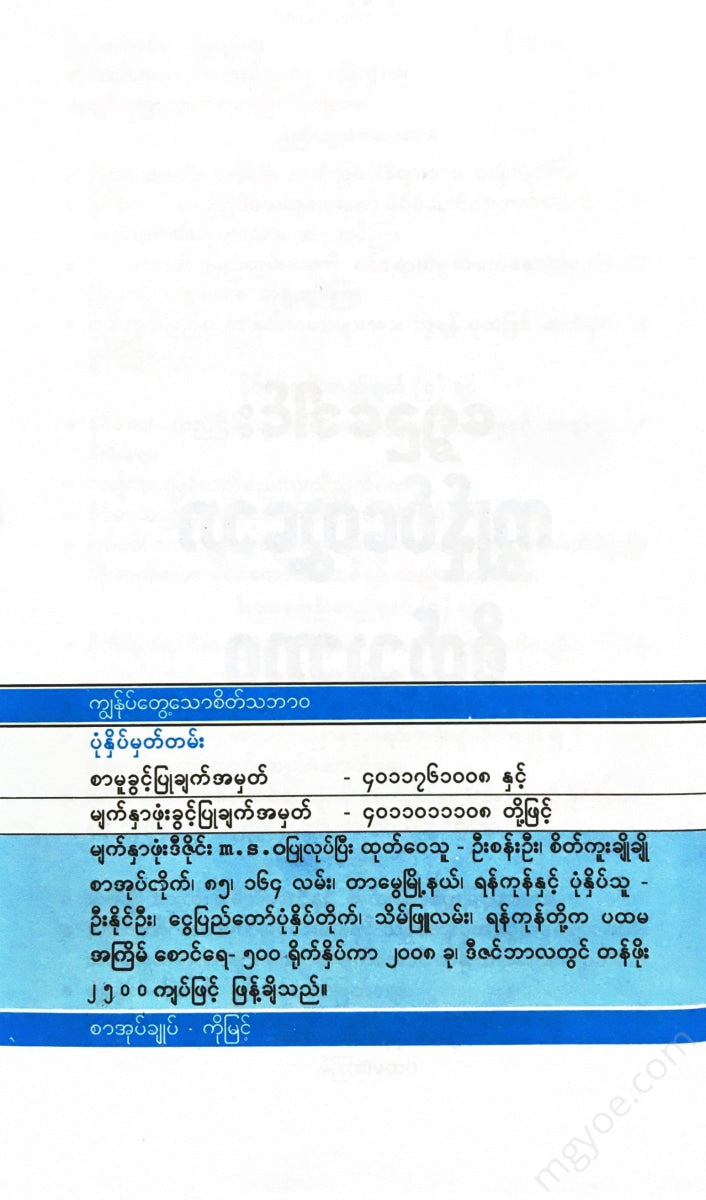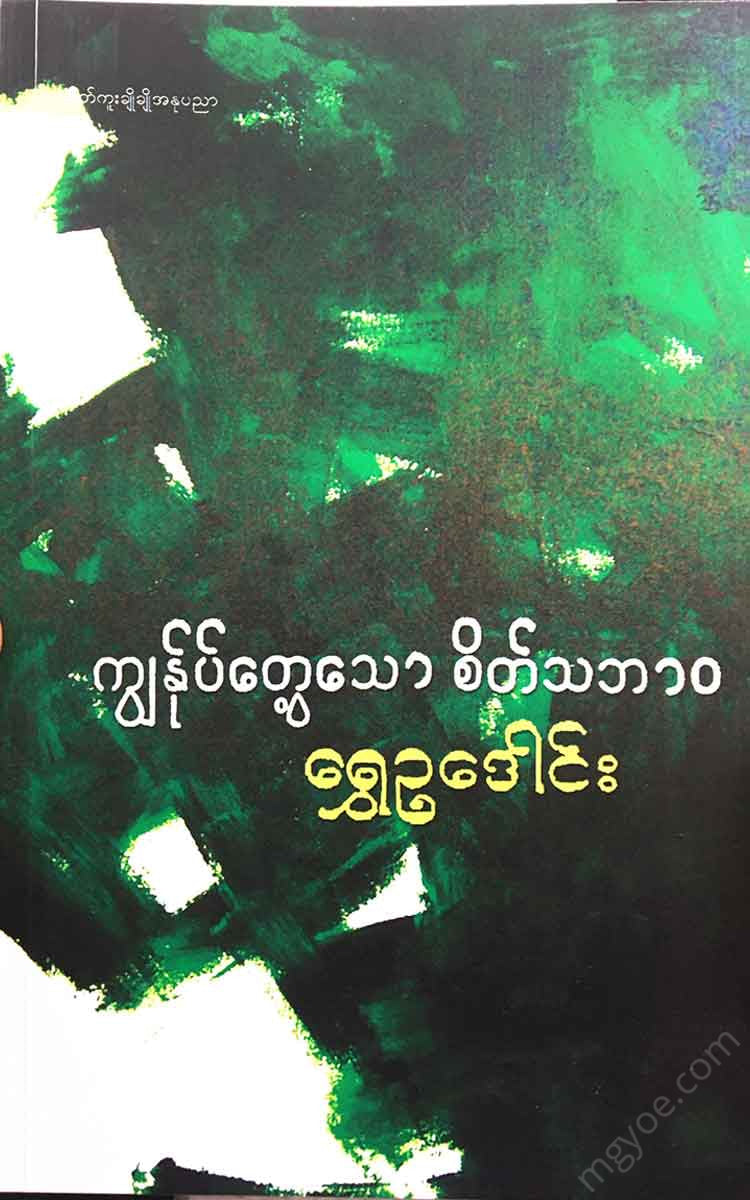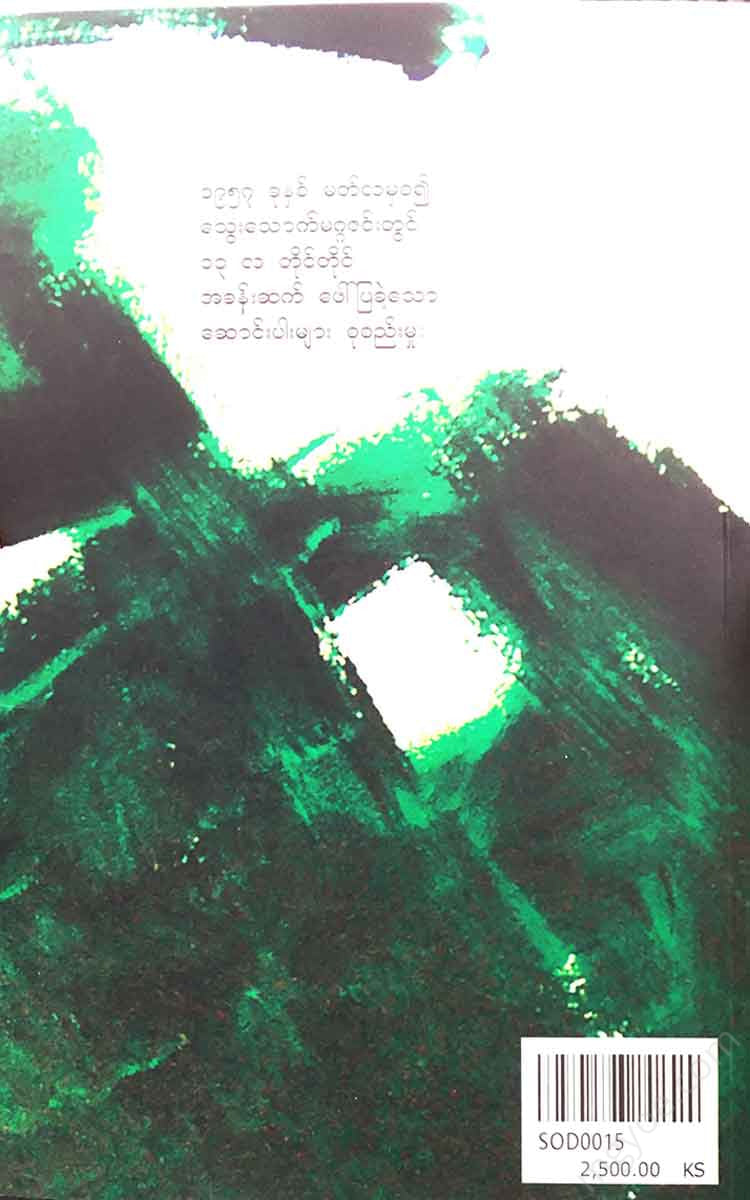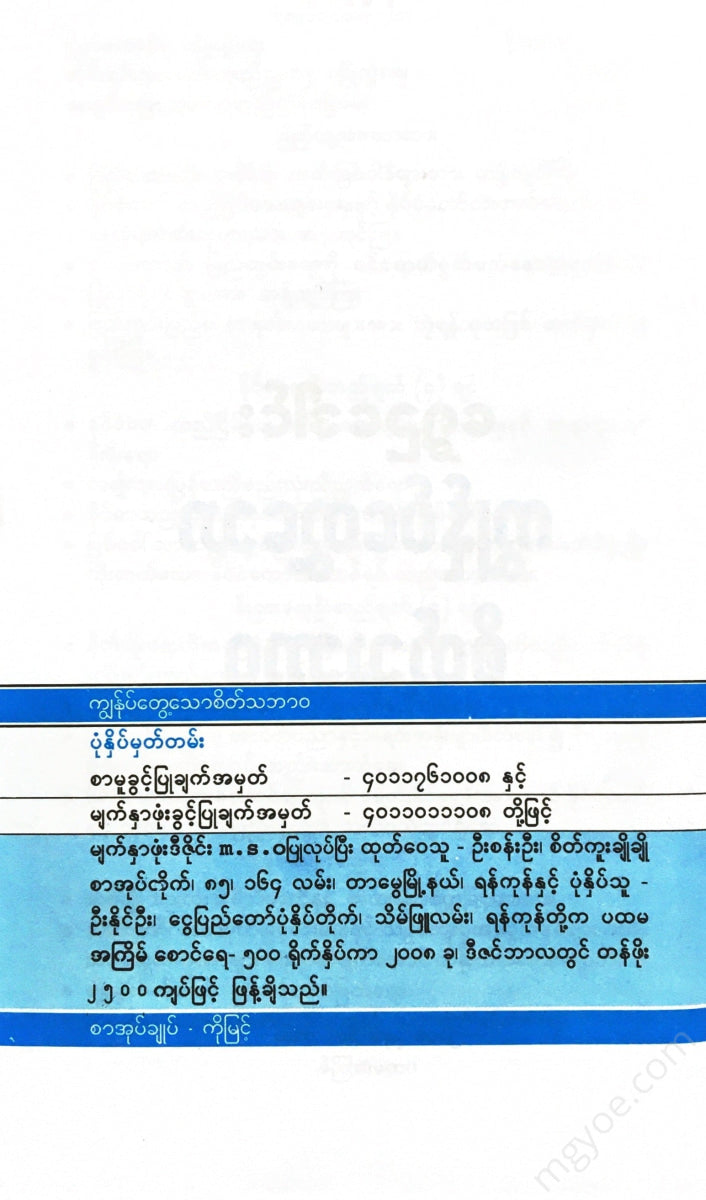စိတ်ကူးချိုချိုစာပေ
Golden Peacock - The Nature of Mind I Found
Golden Peacock - The Nature of Mind I Found
Couldn't load pickup availability
The nature of my mind
At a Buddhist temple, they met two men they called “literate.” One of them said, “You write about us in magazines, but we don’t read magazines. We hear about it from other people.”
Me : "How did you write it?"
Deputy .. “We only know how to read, but you know how to do practical work.”
Me : "If you guys are also working in the real world, you're not among the literati I wrote about."
Mr. P. "I don't want to say that we do it practically. But let me know how you do it practically."
Me .. (as soon as an idea comes to mind) “I can’t express it clearly with my words. I’ll write it in a magazine, so you can read it.”
Deputy .. “We are not the kind of people who read magazines.”
Me : "Then you lose."
Deputy .. “Sir, how much will you lose?”
Me .. “This is what I lose. I asked because you wanted to know how I work, right? If you don’t want to read my answer in the magazine, you lose because you don’t want to know.”
Mr. P. . “But is this so? Even so, you have to wait and read, how long will I write?” Me . . “Originally, I didn’t intend to write it. I thought I would send it next week because I met you. I wrote what I saw, but if it doesn’t fit the text, let me know.”
Deputy .. “Sir, I will write it down in writing, right?”
Me .. “It’s like this, when I came back from my trip to China, I wrote about what I saw and experienced, I didn’t compare it to any other writing. I wrote about what I saw myself. In reality, shouldn’t it be like this? People who copy from other people’s writings, have to compare it with this writing?”
Both of them .. "What a strange person!"
Me : "If I'm writing about China, you can tell me."
Mr. P. "Are you that sure?"
Me .. “I'm sure I'm writing about what I saw, but I haven't been to Beijing yet. If the writing doesn't fit, I have the right to criticize.” Both of them.. “The way you talk makes me want to read.
"Write it down, quickly."
Former monk
I may have the opposite name of a "monk", but I was born to two "monk" parents and was a disciple of a great monk who had worked hard to achieve enlightenment. On the one hand, the virtues and teachings of the monk and his parents, and on the other hand, my passion for having fun with my friends, were pulling me in the opposite direction. However, in a person, there are good and bad things together (I think it would be rare for a person to be completely good). It is the nature of the world that the bad side is more famous. Therefore, it seems that the story of the "Golden Peacock who wants to have fun" who abandoned his wife and children and became a monk and worked hard (not as a monk) is not known to many people. However, it is true that he became a monk at the age of 35 (not because he wanted to gain merit) and worked hard for the path and the family. However, he contracted malaria in a forest monastery and, at the request of his parents, had to change his clothes after 52 days.
Favorite ways
When I was a monk, I practiced according to the above-mentioned young monk's method and the various methods and teachings that have emerged in this era (called the path of enlightenment and enlightenment). My favorite method is the method of insight meditation, also known as cittananupassana, and the method of "diththa diththa mattam" that the Buddha himself taught to Palukyaputta and Bahira.
How to observe mindfulness meditation
In the meditation on the mind, I try to be aware of the mind that arises whenever the inner and outer (senses and aramana) collide. For example, when the eye collides with form, I know that it becomes “seeing mind,” and when the ear collides with sound, I observe and observe that it becomes “hearing mind.” Of the six dual senses, the dual senses of the mind and the dhamma are encountered many times more often than the dual senses of the eye, ear, nose, tongue, and body (in other words, human beings spend their time thinking and thinking). In this way, when each mind is observed, I first think that the mind is seeing once, hearing once, thinking once, jumping up and down.
The beginning of the clue
After about a year and a half of such mindfulness, one day I was looking at something when someone called my name. Suddenly, as I turned around, I had a sudden awareness that made me jump. What I realized was that the moment I turned around and heard the voice, the “seeing mind” ceased and the “hearing mind” arose. I was shocked and amazed by that awareness. Here, the only mind does not jump from here to there. It ends after one perception and becomes new in another. Here, I was deeply happy because I could understand from my heart the Pali sayings of “murangaman, eka saram” that the Buddha had taught me when I was young, which means that one thing becomes one after another. From that moment on, I had a clue about the practical understanding of the mind.
The emergence of the divine wisdom
I met a group of scholars and told them about this incident. “You have just learned about the mind. Didn’t the Buddha say that it is a muranga-eka-asari-guhasara?” They said to me. Because of this, I avoided discussing it with the “scribes.” However, one of them seemed to have some insight and said, “You are right. Since you have seen the nature of the mind’s origin and dissolution, I call it the Udayabhyaya knowledge. In future lives, this knowledge will be the basis for your path and development and will be of help to you.” I accepted the Udayabhyaya knowledge, but when I heard that it would never be of help to you in future lives, I smiled inwardly. For scholars, it seems that achieving the path and development in this life is something that should not be planned or planned.
The most beautiful sight
While searching through the Nikayas on the subject of the Sotapanna, I came across the Bahira Attakapatti. I was very pleased with the Buddha's teaching, "Seeing and seeing is not seen," and I resolved to try to follow it. Although this method is often preached by monks, I have never heard of any kind of knowledge arising from its practical application, either in writing or in sermons. Therefore, I would like to present this story as I have seen it step by step. The Nature of the Mind
According to the Pali word ditthā ditthā matta, one must “brake” one’s mind on the six sense organs: sight, hearing, smell, and taste. To put it simply, when one hears a sound, one must not even think about what it is, but rather control one’s mind. This is also true for the other two doors. Of the six doors, the mind is the most difficult to control. For example, when one hears a shout on the street, one may think for a long time, “Whose voice is it? Why are you shouting? Are they fighting? Are they fighting with my family? I had a fight with the people in the other house yesterday. They are the same people. The voice is a woman’s voice. It sounds like a fight.” This is the nature of the mind.
Wasting time by planning
Furthermore, when we try and follow this teaching, we find that by saying that we should not dwell on a single object for a long time, we also find that we should not dwell on the past, the past, or the future. The mind is naturally inclined to think about the future, not dwelling on the present. Even if we do not encounter any objects such as seeing, hearing, smelling, tasting, or touching, we find that we spend time thinking about past events, or about how we will do things in the future, imagining how things will turn out, or thinking about how things will be better if we do them. We are also doing this with regard to past events. If we do this, we will be satisfied with ourselves, and I see that there is a tendency to waste time with self-satisfaction, such as, "If only I had done that, it would have been better."
Nearby crossing
It is amazing how the mind works even when there is no problem with such concentrated thinking. For example, when a friend suddenly remembers that he is going to arrive by plane, he thinks, “These days, planes are not very reliable. We hear about plane crashes all over the world. In the world, there is a plane crash in Shan State. Aye Maung from Mandalay is lucky to have a “fresh water” fish paste. It has been a long time since I have eaten fresh water fish paste. I am tired of eating it with sauce. If I can taste the Myeik sauce, I will be fine. I have been all over the country, but I have never been to Myeik. I have also been on a sea-going ship. I have been to Myeik once.
